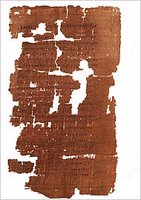 The big science news this week is the discovery of a 1,700-year-old Christian manuscript that portrays Judas Iscariot as a favored disciple and not a betrayer of Jesus.
The big science news this week is the discovery of a 1,700-year-old Christian manuscript that portrays Judas Iscariot as a favored disciple and not a betrayer of Jesus.Scholars say that the manuscript, which includes the only known text of the Gospel of Judas, includes an account of events leading to the Crucifixion that differs sharply from the four gospels in the New Testament.
In this text, Jesus is said to entrust Judas with special knowledge and ask him to betray him to the Roman authorities. By doing so, he tells Judas:
You will exceed [the other disciples]. You will be cursed by the other generations, and you will come to rule over them.
Although some theologians have hypothesized that there was a "good Judas" before, scholars who have translated and studied the newly found text say this is the first time an ancient document lends support to a revised image of the man whose name has been synonymous with treachery.
Release of the text, made available through the National Geographic Society, is sure to set off debate. The authenticity of the manuscript is not at issue, but its relevance is bound to be.
Reports the New York Times:
Already, some scholars are saying that this Gospel sheds new light on the historical relationship between Jesus and Judas. They find strands of secret Jewish mysticism running through the beliefs expressed by some branches of early Christianity.But others say the text is merely one more scripture produced by a marginalized Christian cult of Gnostics, who lived so many years after Jesus' day that they could not possibly produce anything accurate about his life. For these reasons, the discoveries are expected to intrigue theologians and historians of religion and perhaps be deeply troubling to some church leaders and lay believers.
The leather-bound, 26-page papyrus manuscript was found in the desert of Egypt and was written in the Coptic language around A.D. 300.
National Geographic has more here, including a cool window where you can click on and explore the manuscript. Go here for the Times' story.
No comments:
Post a Comment